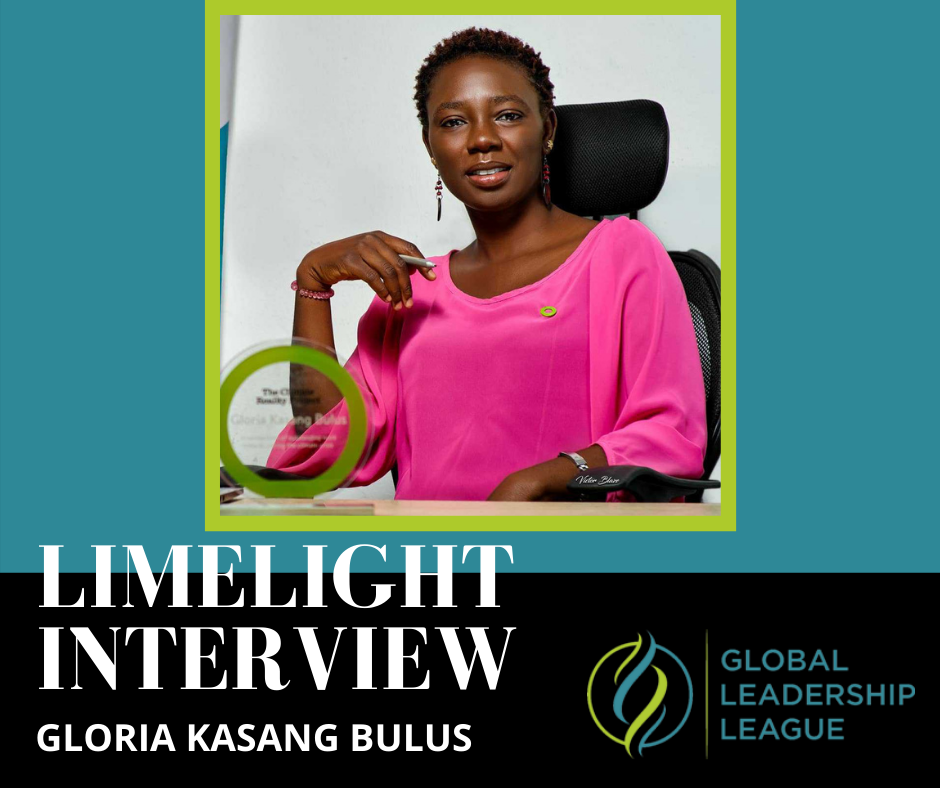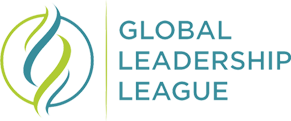
LIMELIGHT INTERVIEW WITH GLORIA KASANG BULUS
Gloria Kasang Bulus trained as a Climate Reality Leader in Washington State in 2017. She lives in Kaduna, Nigeria, and directs “Bridge that Gap,” an NGO working on the climate crisis and various other humanitarian issues, furthering the education of women and children. Last summer 2020, former US Vice President Al Gore presented the Alfredo Sirkis Memorial Green Ring Award to four climate activists at the 44th Climate Reality Leadership Corps Global Training. This Training is a virtual event to train attendees with practical skills and knowledge to build an equitable and inclusive movement for climate action and climate justice. Gloria Kasang Bulus was one of these four climate activists and where I first heard her story.
We are delighted she agreed to share her story with the Global Leadership League, and we are honoured to share her inspirational story with you:
What got you into Climate Action, and how did you start?
I became very concerned and worried about the alarming rate at which climate change was impacting the world, especially in Africa. I knew there was a need for voices to be raised and people to take action. There was a need for people that can influence others to take action and lobby our elected leaders. Looking at the future and the coming generation, I realised there was a need for strong climate action, which has to take place now.
I also understood the need for a clean and healthy environment because we do not have another planet, we only have now. Therefore, it is our responsibility to protect and take care of our environment.
The impact of the climate crisis is worse on the most vulnerable groups, such as children, women, the elderly and the sick, and people living with disabilities. The impact of the climate crisis is also worse on poorer countries due to a lack of capacity for adaptation and mitigation of these crises… these reasons alone were enough for me to take climate action.
Starting out
I started taking action some years ago by visiting schools and teaching kids what climate change was all about and its impact, and how they can take climate action. I taught them using animated videos, games, etc., and also the planting of trees. I then registered a non-profit organisation in Nigeria that is focused more on environmental governance. Later, with support from other organisations, I started media roundtables with journalists to talk about the climate crises and support them in climate reporting.
I also brought together women to talk and advocate on climate action, especially with respect to energy-efficient cookstoves and climate-smart agriculture, through meetings, press briefings, focus group discussions, etc. With time I created a network called Network of Civil Society In Environment, which is comprised of different organisations and individuals working around environmental issues to support taking action collectively because together, we can have better results.
What led you on the climate action journey?
My passion for a sustainable, clean, and healthy environment led me on the climate action journey. My eagerness to save the world for the future generation and avoid the next generation asking questions about why we didn’t take action even when we knew and saw the impact of climate change is what keeps driving me on the climate journey.
Why do you think women are so key in the climate action story and combating climate change?
Climate change impacts everyone, but not equally. Climate change can have a greater impact on vulnerable groups, including women, people living with disabilities, the elderly, and the sick. Climate Change can also have a great impact on developing countries. Women commonly face higher risks and greater burdens from climate change impacts due to existing roles, responsibilities, and cultural norms they have to embrace as women.
If you agree with me, women and girls make up about 51% of the population. To meet the ambitious 1.5 °C target of the Paris agreement, it is critical that the needs, perspectives, and ideas of women are included in climate action so as to create just, effective, and sustainable solutions. Therefore, the role of women cannot be ignored if we truly want to combat climate change.
In climate action, indigenous women play a very important role because they have experienced the impacts of climate change for generations, and therefore, when it comes to environmental conservation and management, they take the lead.
Their knowledge, experience, and expertise will contribute greatly to building resilience to climate impacts. The traditional skills and knowledge that women have relating to natural resource management in areas such as innovation, waste, and energy are effective tools in climate action strategies that I assure you can bring the desired results in addressing climate change.
In building climate resilience in communities, women are very important. I can confidently say that communities strive better in resilience and capacity-building strategies when women are involved in planning. Women are more willing to adapt to environmental changes since their family lives are often more impacted than men. In terms of sharing information about community wellbeing that can involve climate action, which is important for resilience, women are good at this.
By tackling climate change from a gender perspective, women’s rights are also addressed, which means climate justice for women.
What role do you think education plays in climate change?
Education plays a vital role in bringing about behavioural change and plays an important part by teaching people how to live sustainable, eco-friendly lifestyles by becoming carbon neutral, energy-efficient, engaging in proper waste management, and reducing their own ecological footprint.
Education is essential in helping young people understand and address the impact of climate change; it encourages changes in attitudes and behaviour and helps young people adapt to climate change-related trends. In response to climate change, one can’t take away education because of the role it plays in bringing effective results.
How do you get your word across, how do you campaign for climate action?
Basically, I use more women groups and media (both traditional and social media). Media is a powerful medium to get the climate message across to targeted groups and places.
What obstacles have you come across?
Lots of people think climate terms are too scientific and complex to understand. Some people don’t believe there is climate change despite the impact that is evident. They mostly believe some of this is happening from God and can be explained or addressed in that way. Funding, too, is a big obstacle but does not limit me.
What motivates you, and what keeps you going?
My motivation comes from the fact I know that I am making some impact, and I can still make more impact. And that I am able to influence people to take action and speak about the climate crises. The messages of encouragement and commendations I receive daily keep me going, and when I see climate activists all around the world being active and taking climate action, I get motivated to do more.
What advice would you have for the readers reading this in other parts of the world, in education positions, leaders of universities, student advisors, college administrators, etc.?
The climate crisis is no respecter of persons, countries, class, or status. The only difference is some are most vulnerable than others. The responsibility for climate action is for everyone and not selected individuals or countries. We must take action now. We must advocate for a just transition to environmental sustainability. We must understand climate governance and lobby our elected leaders, and we must live eco-friendly lifestyles and continue talking about the solutions to climate change.
- Interview by Global Leadership League member and volunteer, Noreen Lucey
 The mission of the Global Leadership League is to ignite change across the global education field by empowering, connecting, and training leaders. We invite you to reach out to us here or learn more about becoming a member.
The mission of the Global Leadership League is to ignite change across the global education field by empowering, connecting, and training leaders. We invite you to reach out to us here or learn more about becoming a member.
